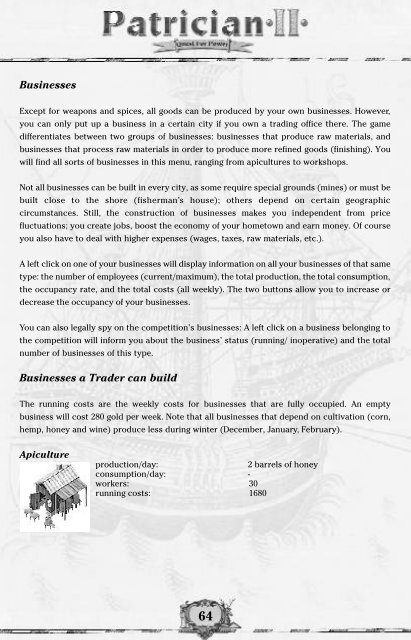User Manual
User Manual - Strategy First
User Manual - Strategy First
- No tags were found...
Create successful ePaper yourself
Turn your PDF publications into a flip-book with our unique Google optimized e-Paper software.
Businesses<br />
Except for weapons and spices, all goods can be produced by your own businesses. However,<br />
you can only put up a business in a certain city if you own a trading office there. The game<br />
differentiates between two groups of businesses: businesses that produce raw materials, and<br />
businesses that process raw materials in order to produce more refined goods (finishing). You<br />
will find all sorts of businesses in this menu, ranging from apicultures to workshops.<br />
Not all businesses can be built in every city, as some require special grounds (mines) or must be<br />
built close to the shore (fisherm a n ’s house); others depend on certain geographic<br />
c i rcumstances. Still, the construction of businesses makes you independent from price<br />
fluctuations; you create jobs, boost the economy of your hometown and earn money. Of course<br />
you also have to deal with higher expenses (wages, taxes, raw materials, etc.).<br />
A left click on one of your businesses will display information on all your businesses of that same<br />
type: the number of employees (current/maximum), the total production, the total consumption,<br />
the occupancy rate, and the total costs (all weekly). The two buttons allow you to increase or<br />
decrease the occupancy of your businesses.<br />
You can also legally spy on the competition’s businesses: A left click on a business belonging to<br />
the competition will inform you about the business’ status (running/ inoperative) and the total<br />
number of businesses of this type.<br />
Businesses a Trader can build<br />
The running costs are the weekly costs for businesses that are fully occupied. An empty<br />
business will cost 280 gold per week. Note that all businesses that depend on cultivation (corn,<br />
hemp, honey and wine) produce less during winter (December, January, February).<br />
Apiculture<br />
production/day:<br />
2 barrels of honey<br />
consumption/day: -<br />
workers: 30<br />
running costs: 1680<br />
64














